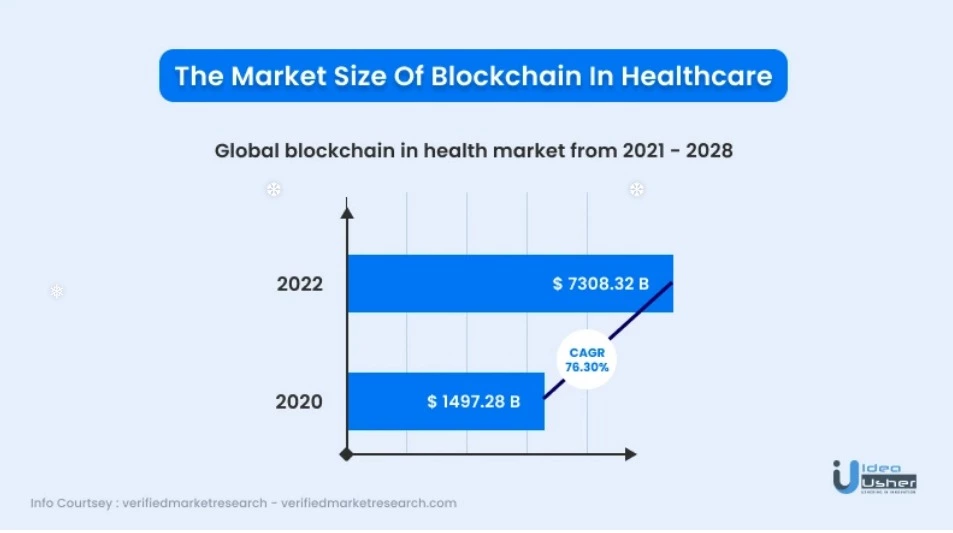Blockchain offers many benefits to the healthcare industry, such as storing patient data, remote monitoring, drug traceability, etc.
However, due to the low availability of blockchain companies in healthcare startups, there is an excellent opportunity for entrepreneurs to invest by building their blockchain-related startups in the healthcare industry.
To get better ideas for your healthcare blockchain-related startups. You can check top companies that are offering their products and services related to blockchain in the healthcare industry.
List of top best healthcare blockchain startups
Here’s the list of the top best healthcare blockchain-related startups. These startups are helping healthcare industries to offer them the best healthcare solutions with the help of blockchain technology.
1. Idea Usher
The company offers blockchain development services to various healthcare startups. Idea Usher identifies business needs and offers them blockchain development services and business solutions to help them fulfill their project goals.
| Started in | 2014 |
| Industry | AI, Blockchain, Medical, Software |
| Location | USA |
| Blockchain application | The company helps businesses integrate blockchain technology and build blockchain-based products and services |
| Real-time impact | Their clients have successfully received blockchain-based products and services for their business needs. |
2. BurstIQ
Bust IQ uses blockchain technology to offer healthcare industries safe and secure data management services. The platform maintains strict compliance with HIPAA rules.
The platforms offer a safer environment to help healthcare industries store and share patient data on blockchain servers and offer services like Big data, Cybersecurity, and others.
| Started in | 2015 |
| Industry | Big data, Cybersecurity, Software |
| Location | Colorado Springs, Colorado |
| Blockchain application | Improves medical security by offering services like BigData and Cybersecurity |
| Real-time impact | The platform keeps complete and up-to-date data about patients’ health |
3. Medicalchain
Medicalchain offers a secure network for healthcare providers to share and access patient data.
In 2018, Medicalchain launched another platform called “Myclinic.com” that allows patients to consult with their doctors through live video, allowing them to pay an official token known as “Medtoken.”
| Started in | 2016 |
| Industry | Electronic health record, Medical |
| Location | London, England |
| Blockchain application | Their platform protects patients’ data and their identity |
| Real-time impact | Their platform “MyClininc.com” enables patients to take consultancy with doctors. |
4. Guardtime
The company helps healthcare industries and governments implement blockchain into their infrastructure to access cybersecurity-related services. Guardtime has recently partnered with a health provider in the UAE to implement blockchain in their healthcare system.
Also, the company has recently partnered with Verizon Enterprise to help them deploy decentralized services based on Guardtime’s Keyless Signature Infrastructure (KSI) blockchain.
| Started in | 2007 |
| Industry | Cybersecurity, Blockchain |
| Location | Irvine, California |
| Blockchain application | Guardtime offers cybersecurity services by using blockchain technology |
| Real-time impact | The company collaborated with Verizon Enterprise to deploy blockchain-based services |
5. Avaneer Health
The platform is backed by Aetna, Anthem, and Cleveland Clinic for using blockchain technology to improve their healthcare infrastructure.
Avaneer Health uses a public ledger to support better claims processing, securing healthcare data exchange, and offering up-to-date directories.
| Started in | 2020 |
| Industry | Big data |
| Location | NA |
| Blockchain application | The platform offers directories to the healthcare industry to maintain and secure patient data. |
| Real-time impact | Their platform helps healthcare providers to secure their patient data |
.
6. Chronicled
Chronicled uses a chain of custody for building its blockchain networks. The company helps healthcare industries to track their data by using IoT technology.
With Chronicled, pharmacy companies can ensure that their medicine has arrived efficiently and aren’t involved in any suspicious activity like drug trafficking.
In 2017, chronicled created a Mediledger project dedicated to providing safety, privacy, and efficiency to medical supply chains.
| Started in | 2014 |
| Industry | Blockchain, Supply Chain Management |
| Location | San Francisco, California |
| Blockchain application | Their blockchain network is used to get detailed reviews of drug shipment |
| Real-time impact | Their company acts as an interoperable system for meeting data privacy requirements to healthcare industries |
7. Robomed
The platform uses AI and blockchain technology to offer a secure environment for storing patient data. Robomed offers services like deploying chatbots, wearable diagnostic tools, and telemedicine sessions to gather patient data and share it with a medical team.
| Started in | 2016 |
| Industry | Blockchain, Medicine |
| Location | Moscow, Russia |
| Blockchain application | Robomed offers AI and blockchain-based services to healthcare industries, such as wearable diagnostic tools. |
| Real-time impact | The Taipei medical university recently implemented Robomed’s network to offer secure storing and sharing of medical records. |
8. Patientory
The company offers end-to-end encryption services to allow healthcare providers to share patient data safely and securely.
Patientory provides access to its platform for healthcare providers to help them store and transfer all information via the blockchain network. The company offers overall patient data records where they can track their history or identify any changes or improvements in their health along with treatment by checking their health data.
The platform offers unique services like a photo diary, where users can upload their photos regularly to compare their progress regarding fitness and healthcare.
| Started in | 2015 |
| Industry | Blockchain, Cybersecurity, Healthcare, IT |
| Location | Georgia, USA |
| Blockchain application | Their blockchain network enables healthcare providers to securely store and secure their important medical information. |
| Real-time impact | Patientory successfully gathered hundreds of healthcare professionals to discuss and learn about blockchain-based healthcare applications. |
9. Doc.ai
The company uses machine language and artificial intelligence technology to offer decentralized services for healthcare industries. The users can share their data with this platform to help researchers use patients’ data for predictive modeling.
The company does not save any patient’s data. The company encrypts data to the blockchain network, and the uploaded data gets wiped out to ensure security and privacy.
| Started in | 2016 |
| Industry | AI, Blockchain, Medical, Software |
| Location | California, USA |
| Blockchain application | The platform employs machine learning technology to decentralize and automate their medical data on the blockchain network. |
| Real-time impact | Doc.ai has recently partnered with a health insurance company to study AI predicting allergic reactions. |
10. Encrypgen
Encrypgen is a blockchain-based platform that helps healthcare industries to search, share, store, buy, and sell genetic information. The company protects user privacy by allowing them to purchase genetic information using safe, traceable DNA tokens.
Their DNA tokens are ERC20-based cryptocurrencies that are available on different exchange platforms.
| Started in | 2016 |
| Industry | AI, Blockchain, Medical, Software |
| Location | California, USA |
| Blockchain application | The platform employs machine learning technology to decentralize and automate medical data on the blockchain network. |
| Real-time impact | Doc.ai has recently partnered with a health insurance company to study AI in predicting allergic reactions. |
11. Blockpharma
Blockpharma is utilizing blockchain technology to combat the global scourge of substandard and counterfeit pharmaceuticals. The healthcare industry is currently facing a major challenge globally due to the proliferation of substandard and counterfeit products.
This problem is particularly rampant in low and middle-income countries, and it affects people everywhere. The use of fake and low-quality medicines contributes significantly to the development of drug-resistant diseases and antimicrobial resistance, leading to more than 800,000 deaths annually.
| Started in | 2016 |
| Industry | Blockchain, Medical, Software |
| Location | Paris, France |
| Blockchain application | Blockpharma is developing a blockchain-based drug traceability and anti-counterfeiting solution |
| Real-time impact | BlockPharma integrates with multiple information systems and stores providing authenticated data on medicines which is stored on Crystalchain |
You can check how blockchain technology is bringing improvement to the healthcare industry.
Blockchain healthcare use cases
The demand for blockchain technology is increasing. Here’s a look at the market size of blockchain in the healthcare industry.

Below are a few key points showcasing how blockchain technology is helping the healthcare industry:
1. Drug traceability
Blockchain offers an immutable record of drug product movement that helps healthcare providers easily track their supply chain from manufacturers to patients.
Due to the immutable nature of the decentralized nature of blockchain-based traceability systems, it offers great security against hacking or any other misuse.
Brands like IBM, Walmart, and KPMG have collaborated with a blockchain solution to track pharmaceutical drugs throughout their supply chain.
2. Medical staff credential verification
Another essential use case of blockchain technology in healthcare startups is medical staff credential verification. It is difficult to verify the credentials of each professional in the healthcare industry.
The use of blockchain technology allows organizations to verify their staff quickly. Moreover, blockchain offers a permanent record for storing credential information that can be used to track the career history of medical staff.
3. IoT security for remote monitoring
IoT gadgets in the healthcare industry are widely used to track patient data such as body temperature, heart rate, and blood pressure. These data are later transmitted to the central location where healthcare professionals monitor them.
However, centralized services are not very secure, allowing hackers to use that sensitive data for personal use. Healthcare providers use blockchain technology to create a secure IoT network for storing and accessing patient data.
4. Data Monitoring
Centralized servers have limitations such as interoperability, data breaches, etc.
Blockchain helps healthcare industries manage their data and maintain electronic health records. Healthcare industries can use blockchain technology to continuously monitor their data, such as blood pressure readings of their patients, prescriptions, and other important, relevant data.
Healthcare industries now get 24/7 data monitoring facilities using blockchain technology to access their data safely and securely.
5. Smart contracts
Smart contract is another use case of blockchain technology. Healthcare industries can use smart contracts to automate insurance claims, schedule appointments, and verify patients to offer them healthcare benefits.
Moreover, healthcare industries can use smart contracts to manage their patient data entry codes to ensure that only authorized individuals can access patients’ information.
6. Clinical trials
According to the report, the market size of clinical trials was $38.7 billion in 2021, which is expected to reach $52 billion by 2026 with a CAGR of 6.1%.
The traditional clinical trial processes are lengthy and complicated due to the limitations of centralized technology, such as less transparency and more restrictions.
To improve the process of clinical trials, many healthcare providers use blockchain technology to access a secure and transparent way to store and manage their clinical trial data.
Also, you can watch this video to get more app ideas for your healthcare startup.
Conclusion
Blockchain offers multiple benefits in the healthcare industry, such as smart contracts, cryptocurrencies, and others.
Anyone who is looking to invest in a future-proof business. then starting a healthcare startup by using blockchain technology is a great idea.
You can do extensive market research in the healthcare industry to know the opportunities you can benefit from by launching your blockchain-based healthcare products and services.
Want to start your own healthcare blockchain startup?-Contact Idea Usher
To create your blockchain startup or implement blockchain technology in your healthcare business, you will need guidance from blockchain developers.
However, finding good blockchain developers for your project is challenging due to their high demand and low availability.
If you want to hire blockchain developers to help you create blockchain products for your healthcare startup or implement blockchain in your healthcare business. You can contact our team.
We at Idea Usher offer complete digital services, including blockchain development and adding advanced technology like AI, IoT, etc.
You can schedule a free consultation call with our team to discuss your project.
Contact Idea Usher
Email:
Phone:
Build Better Solutions With Idea Usher
Professionals
Projects
FAQ
1. What are the use cases of blockchain in healthcare?
These are the following use cases of blockchain technology in healthcare:
- Drug traceability
- Data monitoring
- Smart contracts
- Clinical trials
- IoT security for remote measuring
- Medical staff credential verification
2. How is blockchain used in the healthcare industry?
The Healthcare industry uses blockchain technology for storing and sharing data related to their patients, drug trials, and others.
Blockchain technology helps healthcare industries to improve the performance, security, and transparency of their medical data due to its decentralized nature, such as immutability and transparency.
3. What are the challenges of blockchain in healthcare?
These are the following challenges of blockchain in healthcare:
- Lack of technical knowledge
- Low paperless method adoption
- Less government involvement
- No proper way to implement cost reduction
- Lack of privacy and incentives
- Lower acceptance of cryptocurrency
- Lack of cybersecurity
- Lack of central healthcare
- Limited speed of decentralized servers





















